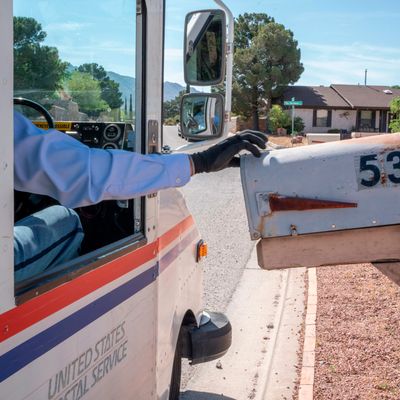
One of the rarely noted but very real problems with universal voting by mail is how it affects communities (notoriously Native Americans) with uneven access to mail services. That has led most vote-by-mail states to create backup systems like conveniently placed drop boxes for “mail ballots” that are never actually mailed.
But in this pandemic year when so many normal business operations are being disrupted or delayed, problems with slow or unsuccessful mail delivery are not so isolated. Combined with skyrocketing demand for voting-by-mail opportunities in much of the country, along with less-than-competent election administration, that has meant that a significant number of intended ballots did not get cast or counted in 2020 primaries, as NPR reported earlier this week:
An NPR analysis has found that in the primary elections held so far this year, at least 65,000 absentee or mail-in ballots have been rejected because they arrived past the deadline, often through no fault of the voter.
While the numbers are relatively small — around 1% in most states — they could prove crucial in a close election, especially one in which many more voters are expected to cast absentee and mail-in ballots to avoid going to the polls during a pandemic.
It’s hard to know in every case whether voters are at fault for missing deadlines, or if they received their ballots (or required mail-ballot applications) too late to meet the deadlines. In the latter circumstances, the question is whether election officials failed to process applications and send out ballots in a timely manner, or if poor mail delivery was the culprit. There’s certainly some anecdotal evidence of this last problem, as described in this report from the Milwaukee Journal Sentinel on Wisconsin’s troubled April primary:
The U.S. Postal Service has identified hundreds of absentee ballots for the April election that never made it to voters or couldn’t be counted because of postmark problems, a new report says.
The post office’s internal watchdog chalked the problems up to receiving outgoing absentee ballots at the last moment from election officials, inconsistent postmarking of ballots and one mail carrier’s inattention to getting absentee ballots to voters in Fox Point.
Wisconsin provided a good example of how hard it is to sort through the causes of delays in mail-ballot delivery this year:
A large number of [Milwaukee] voters who requested absentee ballots on March 22 and March 23 reported they never received their absentee ballots. The postal service couldn’t determine how the mailing of ballots on those days was handled because they were not sent in envelopes with intelligent barcodes that make tracking easier.
But officials now believe the problem with absentee ballots requested on those days stems from a computer glitch with the system that prepares and prints absentee ballot mailing labels. That system is run by the state, not the postal service.
But to the extent that USPS may contribute to mail-ballot problems, things could get worse by November, as the Washington Post reported this week:
The new head of the U.S. Postal Service established major operational changes Monday that could slow down mail delivery, warning employees the agency would not survive unless it made “difficult” changes to cut costs …
Postmaster General Louis DeJoy told employees to leave mail behind at distribution centers if it delayed letter carriers from their routes, according to internal USPS documents obtained by The Washington Post and verified by the American Postal Workers Union and three people with knowledge of their contents.
It doesn’t help that the Trump administration is in mid-vendetta against USPS, mostly because the president thinks it should charge much higher package-delivery rates in order to screw over his enemy Jeff Bezos, owner of Amazon and the abovementioned Washington Post. In addition, Treasury Secretary Steven Mnuchin is trying to gain control over many USPS operations, which has interfered with the disbursement of emergency loans appropriated to the mail service by Congress. Slower or less competent mail-delivery service obviously could affect a wide range of business and personal activities. But it is dawning on some political people that efficient voting by mail could suffer collateral damage, as the Post noted:
“Attacks on USPS not only threaten our economy and the jobs of 600,000 workers. With our states now reliant on mail voting to continue elections during the pandemic, the destabilizing of the post office is a direct attack on American democracy itself,” said Rep. Bill Pascrell Jr. (D-N.J.).
With the president of the United States holding malevolent views on both the USPS and voting by mail, it certainly bears watching.






























